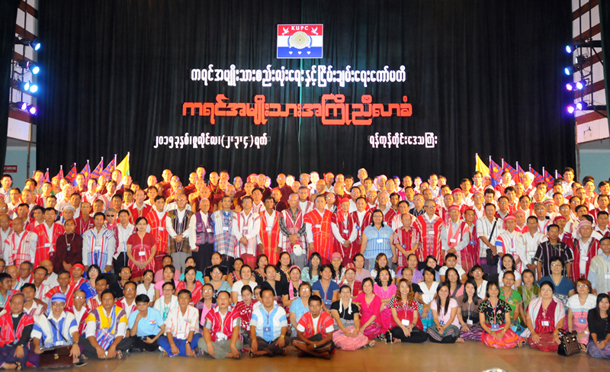Violence once again flared between rival Karen groups this month, adding another chapter to an ignominious history of factional strife and power struggles in Burma’s southeast.
This month, Karen armed groups have been engaged in almost daily skirmishes, resulting in several casualties, following the decision by the Democratic Karen Benevolent Army (DKBA) to sack military leaders San Aung and Kyaw Thet, who reportedly control some 500 troops between them.
A source on the ground said that the Burmese government wanted the pair sidelined because of their control of unlawful toll points along the newly built Asia Highway 1, which connects Thailand’s border town of Mae Sot to Burma’s commercial capital, Rangoon. A total of three Karen armed groups levy fees on the highway, with many trucks now avoiding the route to escape an impost that can amount to 100,000 kyats [US$83] for the journey between Myawaddy and Kawkareik.
The government reportedly asked the local government-aligned Border Guard Force, led by Saw Chit Thu, to apprehend the pair, both of whom are also known critics of the current governmend-led peace process.
Questions linger as to why DKBA chief Saw Lah Pwe failed to protect the two men. San Aung and Kyaw Thet have both earned their stripes for the Karen cause, taking a major role in 2010’s election day fighting in Myawaddy against the Burma Armed Forces against a backdrop of alleged vote tampering and election fraud in the town.
Sources close to the DKBA say that the outfit’s ailing chief, who is battling throat cancer, received 5 million kyats ($4170) from Saw Chit Thu for medical treatment in Singapore during a visit to Rangoon. The decision to cut San Aung and Kyaw Thet loose is believed to be the result of a quid pro quo.
San Aung and Kyaw Thet are now being aggressively hunted by a joint force of the DKBA, the Border Guard Force and Brigade 6 of the Karen National Liberation Army (KNLA).
Whatever the provenance of the fighting, and whatever the government’s role in stoking the flames, to outsiders the latest conflict will be seen as nothing more than another sorry battle in a long line of Karen factional feuds.
Ever since the DKBA split from the Karen National Union (KNU) in 1994 and assisted the Burmese military’s takeover of Manerplaw the following year, the Karen resistance movement has been fractured and resentments have lingered.
Adding to this infamous legacy is the emergence of divisions over the current peace process within and between the KNU, the DKBA and the smaller breakaway Karen Peace Council.
While KNU president Mutu Say Poe supports the efforts towards brokering a nationwide ceasefire agreement, his deputy Naw Zipporah Sein has publicly stated her doubts. It is noteworthy that Zipporah Sein was recently selected to represent the political wing of the Karen armed struggle in future ceasefire negotiations.
On the sideline, the government waits with a soft voice and a big stick, ready to take advantage the next time divisions boil over. Previous divisions splintered the Karen resistance into five armed groups, leading to pitched battles and assassination campaigns waged against rival leaderships. On every occasion, the government has shrewdly capitalized and the military has consolidated its hold over Karen territory.
Those on the ground fear that once San Aung and Kyaw Thet’s forces are wiped out, the next move will be on KNLA Brigade 5 in northern Karen state, led by Deputy Chief of Staff Gen. Baw Kyaw Heh. He controls the strongest contingent in the KNLA and has doubts about the current peace program as a result of the military increasing its presence in his territory during ceasefire negotiations.
Unless the Karen armed groups learn to avoid repeating the same mistakes, they risk global pariah status at a time when their true opponents in the government and the military have waged an astonishingly successful campaign to rehabilitate themselves. The irony will not be lost on dedicated observers when the men and women of the Karen leadership—custodians of a decades-long struggle for autonomy, equality and self-determination—are considered lesser moral authorities than the men and women of Naypyidaw.
Saw Yan Naing is a senior reporter for The Irrawaddy, currently on a US fellowship program with Alfred Friendly Press Partners.

















